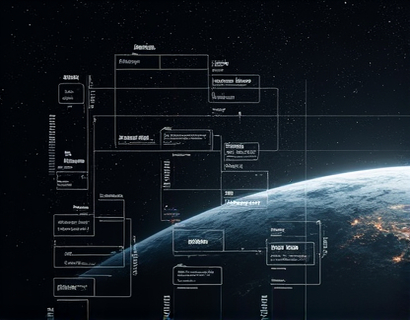Unlocking Economic Prosperity in Modern Ecosystems: Strategic Insights for Market Success
In the rapidly evolving landscape of global economics, understanding and navigating modern ecosystems has become crucial for professionals aiming to unlock economic prosperity. This comprehensive guide delves into the intricate dynamics of these ecosystems, offering strategic insights and detailed analysis to help economists, business leaders, investors, and industry experts stay competitive and informed. The focus is on identifying and capitalizing on emerging market opportunities, essential for thriving in today's dynamic economic environment.
Understanding Modern Ecosystems
Modern ecosystems, often referred to as economic ecosystems, are complex networks of interconnected entities including businesses, consumers, governments, and technological platforms. These ecosystems are characterized by their ability to adapt, innovate, and create value through collaboration and competition. Unlike traditional economic models, modern ecosystems are fluid and dynamic, driven by technological advancements, changing consumer behaviors, and global interconnectedness.
The concept of an ecosystem in economics is borrowed from biology, where ecosystems are networks of living organisms interacting with their environment. In the economic context, this translates to a web of relationships where each participant plays a role in the overall functionality and success of the system. Understanding these interactions is key to unlocking the economic potential within these ecosystems.
Key Components of Modern Economic Ecosystems
Several key components define modern economic ecosystems, each playing a vital role in their operation and success:
- Interconnectedness: The relationships between various entities within the ecosystem, including partnerships, supply chains, and value networks.
- Innovation: The continuous introduction of new products, services, and processes that drive growth and efficiency.
- Adaptability: The ability of the ecosystem to respond to changes in the external environment, such as market shifts or technological disruptions.
- Value Creation: The processes through which value is generated and distributed among participants, including consumers, businesses, and the broader community.
- Sustainability: The long-term viability of the ecosystem, ensuring that growth does not come at the expense of environmental or social well-being.
Each of these components interacts in complex ways, creating a resilient and dynamic system capable of fostering economic prosperity. For instance, innovation often leads to new business models and products, which in turn create new market opportunities and drive economic growth.
Strategic Insights for Navigating Modern Ecosystems
To successfully navigate and capitalize on the opportunities within modern economic ecosystems, professionals must adopt a strategic approach. Here are some key insights:
Embrace Collaboration
Collaboration is a cornerstone of modern ecosystems. By forming strategic partnerships and alliances, businesses can pool resources, share risks, and access new markets. Collaboration can take various forms, from joint ventures and co-creation of products to shared research and development efforts. For example, tech companies often collaborate with academic institutions to leverage cutting-edge research and talent.
Moreover, collaboration extends beyond the business sector. Governments and non-profit organizations can play pivotal roles by creating frameworks that encourage cooperation and innovation. Public-private partnerships, for instance, can drive large-scale infrastructure projects that benefit the entire ecosystem.
Foster a Culture of Innovation
Innovation is the engine that propels modern ecosystems forward. Companies must cultivate a culture that encourages creativity, experimentation, and risk-taking. This involves investing in research and development, hiring talent with diverse skill sets, and creating an environment where failure is seen as a learning opportunity.
Open innovation, where external ideas and technologies are integrated into the innovation process, can also accelerate growth. Platforms that facilitate idea sharing and collaboration, such as open-source projects and innovation hubs, are becoming increasingly important. By embracing open innovation, businesses can tap into a broader pool of talent and knowledge, enhancing their competitive edge.
Adapt to Change
The ability to adapt quickly to changing conditions is crucial in modern ecosystems. This requires a deep understanding of market trends, consumer behaviors, and technological advancements. Companies must be agile, able to pivot their strategies in response to new information and shifting dynamics.
Scenario planning and future forecasting can help organizations prepare for potential changes. By considering various future scenarios, businesses can develop flexible strategies that remain effective under different conditions. This proactive approach enables companies to stay ahead of the curve and capitalize on emerging opportunities.
Focus on Value Creation
Value creation is the lifeblood of any economic ecosystem. To thrive, participants must focus on delivering value to consumers and other stakeholders. This involves not only improving products and services but also enhancing the overall customer experience.
Value can be created through various means, such as personalization, convenience, and sustainability. For instance, companies that prioritize sustainability can attract environmentally conscious consumers and reduce long-term costs through efficient resource use. By aligning value creation with broader societal goals, businesses can build stronger relationships and enhance their reputation.
Prioritize Sustainability
Sustainability is no longer a niche concern but a fundamental aspect of modern economic ecosystems. Sustainable practices ensure that economic growth does not compromise environmental integrity or social well-being. This involves adopting practices that minimize environmental impact, promote social equity, and ensure economic viability in the long term.
Companies that integrate sustainability into their core strategies can benefit from increased consumer trust, access to new markets, and reduced regulatory risks. For example, businesses that invest in renewable energy and circular economy models can reduce operational costs and appeal to a growing base of eco-conscious consumers.
Case Studies: Successful Navigation of Modern Ecosystems
To illustrate the strategic insights discussed, let's examine a few case studies of companies that have successfully navigated modern economic ecosystems:
Apple Inc.
Apple is a prime example of a company that has thrived in a highly interconnected and innovative ecosystem. By fostering strong partnerships with suppliers, developers, and retailers, Apple has created a seamless user experience that sets its products apart. The company's focus on innovation, evident in products like the iPhone and Apple Watch, has consistently driven growth and market leadership.
Apple's adaptability is also noteworthy. The shift from physical stores to a strong online presence, coupled with the introduction of services like Apple Music and Apple Pay, demonstrates the company's ability to evolve with changing consumer preferences and technological advancements.
Tesla, Inc.
Tesla has revolutionized the automotive industry by integrating technology and sustainability. The company's focus on electric vehicles and renewable energy solutions has not only disrupted traditional car manufacturing but also created new market opportunities. Tesla's collaboration with technology firms and its commitment to innovation have been key to its success.
Tesla's adaptability is evident in its rapid scaling of production and expansion into new markets. The company's Gigafactories, designed for large-scale battery production, exemplify its ability to address supply chain challenges and drive down costs, making electric vehicles more accessible to a broader audience.
Airbnb Inc.
Airbnb has transformed the hospitality industry by leveraging the sharing economy. The platform connects travelers with local hosts, offering a unique and personalized travel experience. Airbnb's success is rooted in its ability to collaborate with a vast network of hosts and its focus on innovation, such as the introduction of new features like instant booking and trusted reviews.
Adaptability has been crucial for Airbnb, especially in navigating regulatory challenges in various cities. The company's proactive approach to compliance and community engagement has helped it maintain its growth trajectory despite obstacles.
These case studies highlight the importance of collaboration, innovation, adaptability, value creation, and sustainability in navigating modern economic ecosystems. By adopting these strategies, businesses can unlock significant economic potential and achieve long-term success.
Conclusion
Unlocking the economic potential of modern ecosystems requires a deep understanding of their intricate dynamics and a strategic approach to navigating the challenges and opportunities they present. By embracing collaboration, fostering innovation, adapting to change, focusing on value creation, and prioritizing sustainability, professionals can position themselves and their organizations for success in the dynamic economic landscape of today.
As the global economy continues to evolve, staying informed and agile will be essential. By leveraging the insights provided in this guide, economists, business leaders, investors, and industry experts can better navigate the complexities of modern ecosystems and capitalize on emerging market opportunities.










































